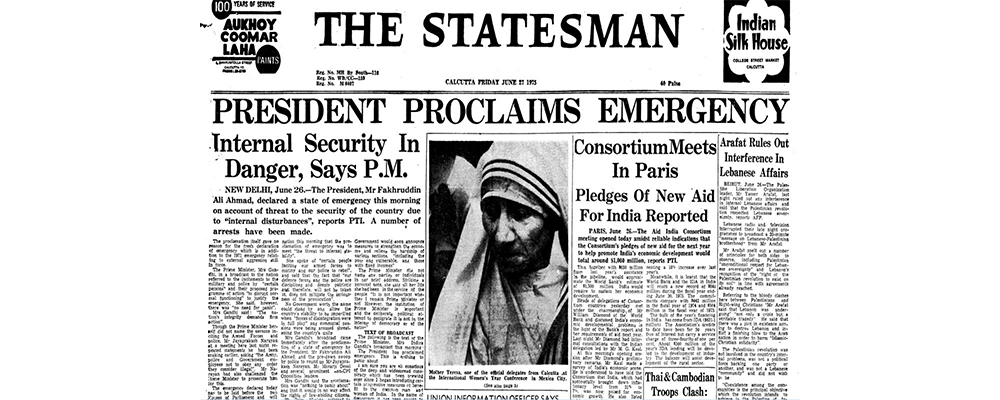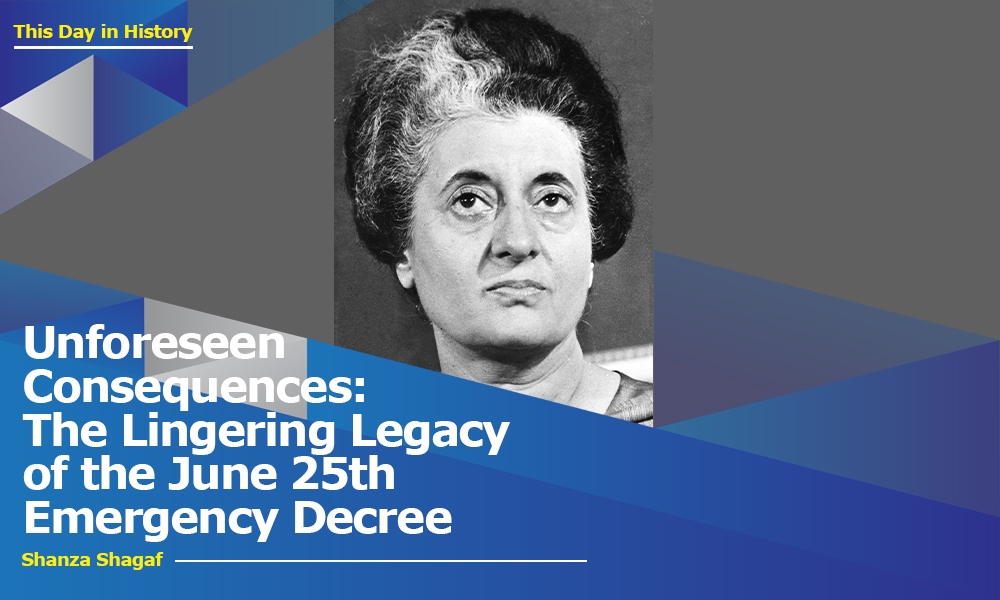Testimonial

Background
Before the Emergency in 1975, India had a turbulent time characterised by political unrest and economic difficulties. Growing criticism and resistance to Indira Gandhi’s rule came from inside and beyond the Indian National Congress, her party. Social tensions increased because of economic problems, such as high unemployment and inflation, which stoked popular unrest. Concurrently, worries over the government’s growing authoritarian inclinations and the deterioration of democratic values contributed to the general disquiet. Power battles and internal dissent within the Congress party further shook the political system. The Emergency proclamation marked a dramatic escalation against this unrest and dissatisfaction, ushering in a time of increased government control and suppression of civil freedoms and leaving a lasting impression on India’s political history.
Declaration of Emergency:
Citing domestic unrest, Indira Gandhi declared a state of emergency on June 25, 1975, by invoking Article 352 of the Indian Constitution. This came after the verdict earlier that month by the Allahabad High Court, which declared her parliamentary election to be illegal because of electoral misconduct. Gandhi responded by imposing censorship, suspending civil freedoms, and imprisoning political rivals to strengthen her position of power. Widespread restrictions and imprisonment during the Emergency regime sparked discussions about democracy and government. Some denounced Gandhi’s measures as autocratic, while others defended them as essential for maintaining stability. This historical period had a long-lasting effect on Indian politics, dividing the populace and influencing subsequent debates over governmental authority and democratic ideals. Organisations like the Rashtriya Swayamsevak Sangh (RSS) and the Jamaat-e-Islami Hind were temporarily banned.
Suspension of Civil Liberties:
Practices that frequently occur under emergencies include the suspension of civil freedoms, the establishment of press censorship, and the imprisonment of opposition leaders, activists, and journalists under laws about preventative detention. Human rights concerns are raised using legislation such as the Maintenance of Internal Security Act (MISA), which permits imprisonment without charge or trial. Such actions may profoundly affect individual rights, freedom of speech, and democracy. Since these ideas are the cornerstone of a free and equitable society, civilisations must maintain them even in difficult times.
Centralisation of Power:
Indeed, India’s democratic system suffered greatly from the Emergency’s concentration of power, which saw Indira Gandhi and a small number of advisors making most of the country’s choices. The democratic ideals of decentralisation and checks and balances may be compromised by the thinning of the federal government and the omission of state governments from decision-making procedures. The country’s democratic foundation may be weakened by this concentration of power in the hands of a select few, which might result in a lack of openness and accountability. A democracy must preserve the balance of power between the federal and state governments to guarantee that different voices are represented and may participate in decision-making.
Forced Sterilization Campaign:
One particularly contentious element of the Emergency is the forced sterilisation program, which was widely criticised for its use of coercion and abuses of human rights. Such actions violated people’s liberty and rights to procreate, with long-lasting social, psychological, and bodily effects. The concepts of consent and dignity were undermined by coercion, underscoring the morally difficult situation. Preserving human rights requires acknowledging and learning from past occurrences, especially in emergencies. Promoting voluntary and safe family planning methods should be the top priority to provide people with reproductive freedoms.
End of Emergency and Return to Democracy:
With the announcement of general elections by Indira Gandhi in March 1977, the Emergency period ended. The people of India overwhelmingly voted her out of government, bringing in a combination of opposition parties called the Janata Party. This historic occasion marked the end of the Emergency and the return of democracy to India. India’s democratic institutions have proven resilient, and the country’s commitment to preserving democratic values—such as pluralism, free and fair elections, and respect for civil liberties—has been confirmed by the peaceful transfer of power. This historic incident shows how people can influence political decisions and defend democratic principles.
Legacy
The Emergency remains a highly contentious episode in Indian history, giving rise to continuous discussions over its rationale, the impact it had on democracy and personal liberties, and its lasting sway on Indian politics. It serves as a sobering reminder of how crucial it is to protect democratic institutions and core values even during crises. The era serves as a warning, emphasising the risks associated with unbridled presidential authority and the degradation of civil freedoms. Indian society can ensure that past mistakes do not happen again and that the principles of democracy remain robust by thinking back on the lessons learned during the Emergency and reaffirming its commitment to democratic values.
ITS EFFECT ON THE CONTEMPORARY WORLD:
India’s modern history has been profoundly impacted by the Emergency, which has had a long-lasting effect on the nation’s institutions, politics, and society. First and foremost, the Emergency altered India’s political landscape by highlighting the significance of checks and balances in a democratic system and forcing a reevaluation of the authority balance between the executive, legislative, and judicial government institutions. Second, the Emergency’s suspension of civil liberties made it clear how important it is to defend basic freedoms like the right to free speech and expression. This prompted further efforts to guarantee their maintenance in modern-day India.
Furthermore, the Emergency’s censorship exposed how susceptible the media is to governmental manipulation, igniting continuing debates concerning journalistic ethics and press freedom. In addition, India’s democratic institutions proved resilient when the Emergency was lifted and the Congress party, led by Indira Gandhi, lost in the 1977 elections, cementing India’s position as the largest democracy in the world with free, fair, and frequent elections.
Recollections of the Emergency also persist in shaping discussions about authoritarianism, warning against the consolidation of power and the deterioration of democratic standards. Furthermore, the abuses of the Emergency prompted legislative changes meant to fortify democratic institutions and protect individual liberties, with the court serving as a crucial check on the integrity of constitutional values.
Reminiscences of the Emergency continue to influence conversations about authoritarianism, serving as a cautionary tale about the abuse of democracy and the concentration of power.
Additionally, the excesses of the Emergency led to legislative amendments intended to safeguard individual freedoms & strengthen democratic institutions, with the court acting as a vital check on the integrity of constitutional ideals.


0 Comments